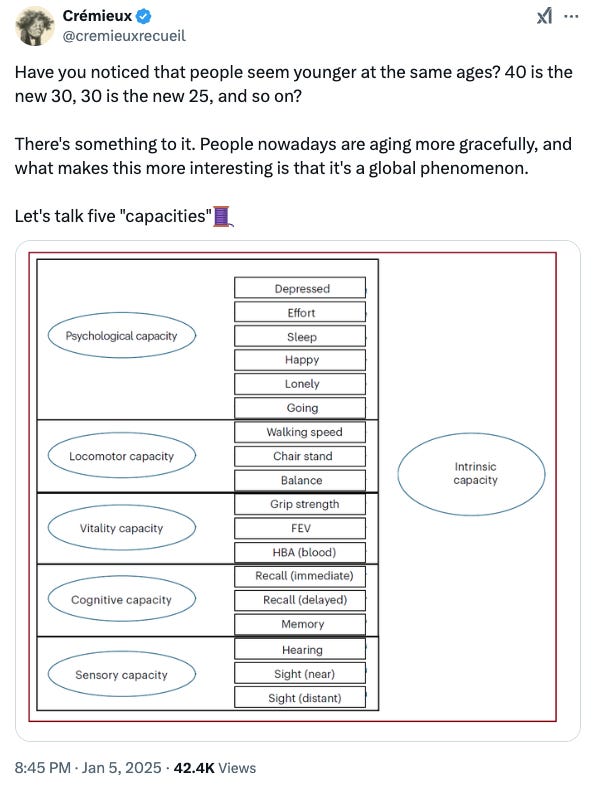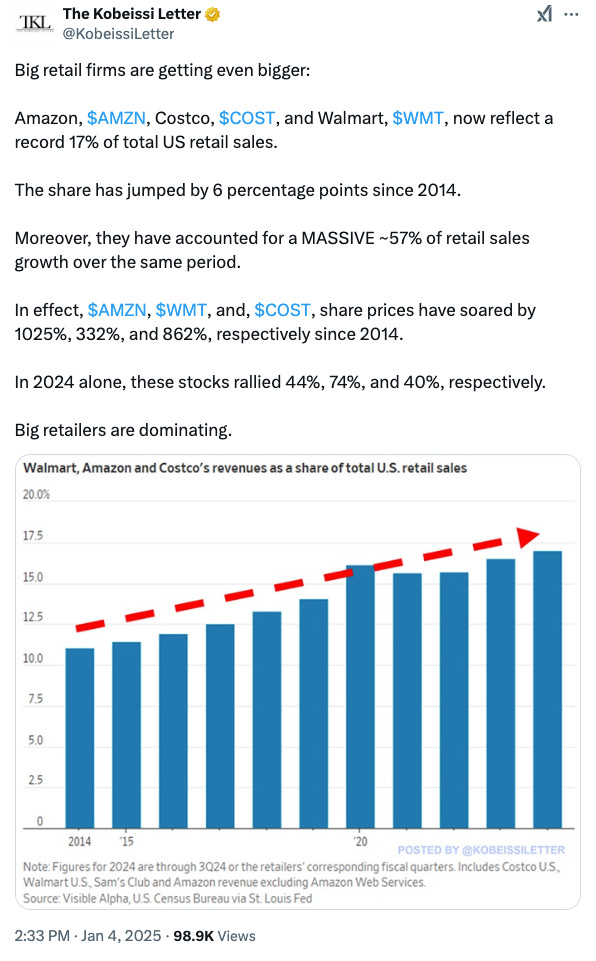What I Read This Week…
Wall Street expects more companies to go public in 2025, Nvidia is expanding beyond AI chips into robotics, and Constellation Energy won a $1 billion contract to supply nuclear power to the government
Read our Deep Dive: A Primer on Cryptocurrencies
Caught My Eye…
Investment bankers and private equity investors expect more companies to go public in 2025 as private equity firms look to sell their holdings in a strong stock market. The IPO market raised $32 billion in 2024, which was 60% more than 2023, and most large IPOs performed well after listing. Private equity-owned companies like Medline and Genesys have filed IPO paperwork, while venture-backed firms like Klarna and Chime (valued around $15-20 billion) plan to go public. This IPO cycle could be different from 2021, as institutional investors currently prefer established, profitable companies over startups, and companies accept lower valuations than in 2021. While IPO proceeds won't reach the $150 billion raised in 2021, investment bankers expect it to top the pre-2020 average of $38 billion per year. Several factors support this outlook: the Fed has started cutting interest rates, Trump's policies are expected to favor business, more sectors beyond technology companies are seeing stock price increases, and private equity firms need to return money to their investors after a slow period in dealmaking. This points to an IPO market built more on established businesses than speculative investments.
Nvidia is expanding beyond AI chips into robotics, with plans to launch Jetson Thor, a new computer for humanoid robots, in early 2025. What's driving this expansion? Nvidia aims to become the leading platform for autonomous machines by building all the key technologies needed to develop and operate robots. Their offering includes the Isaac robotics platform with AI libraries, simulation tools, NIM which provides pre-built software components for robot functions, and OSMO which coordinates multiple robot tasks. The company is building a three-level system: large computers to train robot AI, software to test robots in virtual environments before real use, and specialized computers that run directly on the robots. Nvidia has also secured key partnerships with BYD Electronics for mobile robots, Siemens for skills development, and Alphabet's Intrinsic for robot software. By providing the underlying technology platform for robot manufacturers, Nvidia is positioning itself to capture value from the growing demand for AI-powered autonomous machines.
The U.S. Federal Government is investing in domestic nuclear power supply through new contracts and funding while reducing dependence on foreign uranium. What’s driving this? Constellation Energy recently won a $1 billion contract to supply nuclear power to 13 federal agencies, covering 80 federal facilities across the PJM transmission network, a regional power grid serving 13 states in the eastern U.S. At the same time, the Department of Energy is investing $2.7 billion to boost domestic nuclear fuel production and $900 million to support small modular reactor deployment. The government has also banned Russian uranium imports and is supporting domestic production of low-enriched uranium. Private companies are joining this push - Google signed the first corporate agreement to buy power from small modular reactors being developed by Kairos Power. These moves come as the U.S. maintains its position as the world's largest nuclear power producer, generating 30% of global nuclear electricity and providing 18% of U.S. electrical output. This coordinated effort aims to strengthen U.S. energy independence while reducing reliance on foreign suppliers, particularly Russia.
Other Reading…
How AI-Assisted Coding Will Change Software Engineering (The Pragmatic Engineer)
Why 2025 Will be the Year of AI Orchestration (VentureBeat)
A New Electricity Supercycle is Under Way (The Economist)
‘High Electricity Prices in California Have Nothing to Do With Renewables’ (Photovoltaics Magazine)
PFAS Manufacturers Sued for Deceptive Marketing in the U.S. (Chemistry World)
The U.S. Army Needs Cheaper Drones to Compete (The Economist)
Can I Afford to Retire? Gen X Trails Baby Boomers and Millennials in 401(k) Savings (Bloomberg)
On X…





Chamath I am 19 years old I love what you are doing. But nonetheless I love the content you push out very informative and you are teaching me so much about the financial markets and how to look, dissect, and then make moves on the markets. I love the ALL IN POD. All this is so interesting bro just know you are doing gods work here bro!!
great share